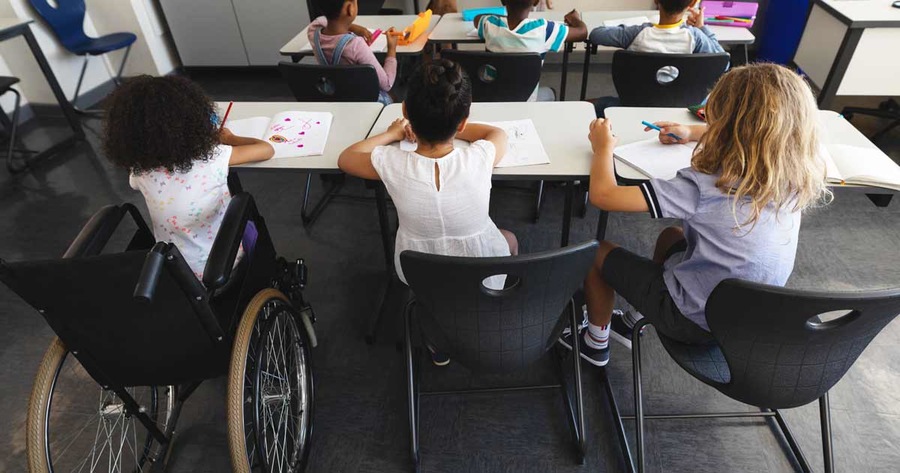With an intentional focus on youth voice and use of supportive laws, programs are uniquely situated to augment the structures that exist in school in a coordinated manner, after school. In particular, there are strategies program directors can implement to create empowering opportunities that enhance the positive outcomes and long-term benefits for students with disabilities.
With our nonprofit organization Nevada P.E.P., we have developed a youth-led engagement program with an emphasis on youth with lived experiences in mental health that's rooted in systems advocacy, including peer-to-peer support, self-advocacy and empowerment. Although not a traditional afterschool program, our Youth M.O.V.E chapter illustrates the incredible possibilities for students with disabilities through a balance of skill development, inclusion and mentorship.
For instance, our chapter engaged with elected officials and adult leaders in the coordination of Nevada's 2019 Children's Mental Health Week to provide the "youth voice" in a variety of systems advocacy efforts in the community to raise awareness about mental health. We had a seat at the leadership table in the development of outreach campaigns, interactive discussions and project vision at each stage of the process.
Based on our experiences, we recommend programs incorporate these three principles to support students with disabilities:
- The opportunity for students to develop their voices and choices through a practical emphasis on skills development.
- A priority placed on inclusive activities and settings.
- When applicable, an effort to connect the afterschool activities to education services.
We intentionally create our programs to ensure that these principles are embedded in our efforts. Lastly, our Youth M.O.V.E chapter highlights that programs for students with disabilities include students with mental health needs, as well.
Nothing About Us Without Us
Afterschool programs are the perfect place for students to develop voice and self-advocacy ability. The slogan "Nothing about us without us" is integral to the disability rights movement. Fundamentally, people with disabilities are the experts in what they need and should be involved in the creation of the programs and services that support them.
Students with disabilities benefit from afterschool programming that develops leadership voice, encourages mentorship, and teaches self-advocacy—especially during the transition to adulthood. Because students with disabilities will more likely need to navigate systems and access services, this opportunity is even more valuable. As coordinators of afterschool programs, we have the singular ability to tailor our efforts to encourage this voice and self-advocacy focus. A school day is meaningfully supplemented with an afterschool program that creates the social capital for transition.
Full Inclusion is Essential
For students with disabilities, inclusion in the community is a necessary ingredient. Every program must be both in an integrated environment and encourage a philosophy of inclusion. Specifically, this means programs should not segregate students with disabilities or meet separate from the community. Since students with disabilities are included in integrated settings in school, all programs should do the same. In fact, most students with disabilities will have an Individualized Education Program (IEP) while in school. The Individuals with Disabilities Education Act (IDEA), the federal law related to special education and IEPs, identifies that students must be educated in the Least Restrictive Environment (LRE). All afterschool activities should strive to offer programs following this standard.
Coordination with the IEP
The IEP is an excellent aid to the delivery of afterschool programs in many ways. Through a developed relationship with each student's IEP team (often including students with mental health needs), an afterschool program can be included as part of a student's special education services.
For example, afterschool professionals, if invited, can attend IEP meetings and provide valuable feedback to the IEP team that demonstrates student success, contributes to goals, and supports accommodations. An afterschool program director can even learn specific modifications and accommodations to support the student in their program.
The IEP also gives afterschool programs the opportunity to connect with the student's family and ensure programming incorporates family voice and choice. On top of that, afterschool programs may be directly part of the IEP. If a program is delivered by the school district, the program may be directly part of the student's special education services.
For students who are 16 and older, the IEP requires transition services to support a student's transition from high school to adulthood. The IEP includes a section devoted to in the transition services category that includes a "Coordinated Set of Activities" that identifies "Community Experiences," which includes services and opportunities in the community by either schools or other agencies. In essence, for students who are of this age, the afterschool activity can be included as part of the special education services related to the student's transition.
As providers of afterschool programs, you have the power to inspire and motivate a new generation of leaders. With these steps, you can create a dynamic system for your participants that will ensure that each student leaves each day exclaiming, "Nothing about us without us!"
Written by Alex Cherup and Allison Stephens, Nevada P.E.P. Statewide Family Network.

